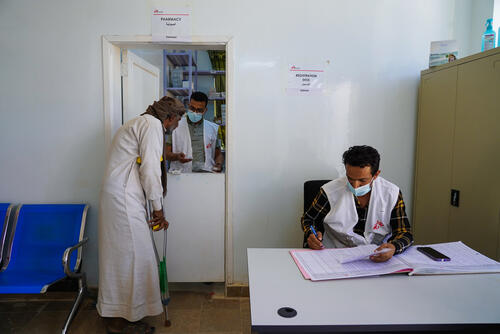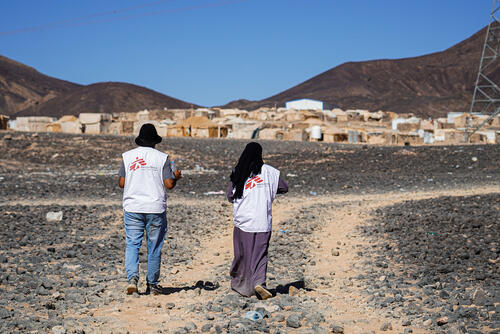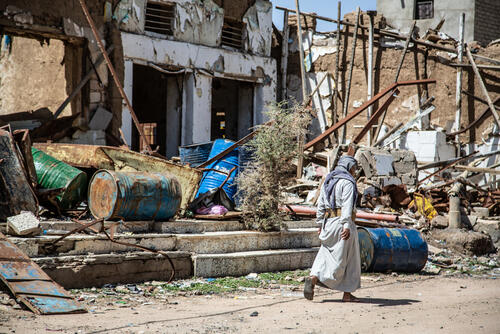The health system in Yemen has largely collapsed during the war. Health facilities – including those run or supported by MSF – have been destroyed in the fighting.
Following the outbreak of the war, the imposition of a blockade by the Saudi-led coalition and high inflation have crippled Yemenis’ access to healthcare and other essential services.
War and violence
Despite the announcement of the UN-brokered truce in April 2022, and its extension until October 2022, which has reduced the intensity of the war, heavy fighting erupted in Ataq city, in Shabwa governorate in August 2022. The fighting led to influxes of wounded arriving in the hospital supported by MSF in the city, but also in multiple healthcare centres across the governorate.
As the truce encouraged some people to move to their regions of origin, civilians moving around Beni-Hassan area, in Hajjah governorate, were increasingly affected by landmine explosions.
Between January and March 2022, fighting escalated drastically on several frontlines across Yemen, raising urgent concerns for the safety of people. Our teams, as well as facilities supported by MSF, have treated more than 90,000 patients wounded by violence across 12 governorates since March 2015.
According to the Yemen Data Project, over 2,500 civilians were killed or injured by armed violence in Yemen in 2021, marking a 20 per cent increase from 2020.
Neglected health needs
Many MSF hospitals are often overwhelmed by the number of patients we receive. This is not only because of the increased demand brought about by the protracted conflict and the limited number of health actors, but also because patients that would otherwise be treated at a basic healthcare level are obliged to seek specialised healthcare, due to the almost non-existent affordable quality general healthcare services.
Even where medical facilities are operational, most people are unable to afford the transportation costs to reach them. This prevents patients from seeking timely care, allowing easily curable health conditions to become severe or deadly. Women often give birth at home and seek care only when complications occur. Malnutrition among children remains high and continues to be a serious concern.
In addition, insufficient funding and inefficiency in the humanitarian response are impacting the provision of healthcare and its quality over the long term. Some actors have reduced their activity and many humanitarian activities are being implemented without proper monitoring and evaluation to ensure assistance is reaching the people who need it most.

Malnutrition
Malnutrition remains a consistent health concern among people, with seasonal and annual peaks witnessed and treated across our projects. This was the case even before the war, but the direct and indirect effects of the eight-year-long conflict have exacerbated food insecurity.
MSF does not have a full view of the nutritional status in the country, partly because insecurity and access constraints do not allow us to conduct large-scale surveys. However, there are areas where we see rising numbers of malnourished children, notably in north-western Yemen’s Hajjah governorate, where our teams saw an alarming rise in cases among children under five years old in 2021.
The cause of malnutrition in children is not just lack of food, it is also linked to how families struggle to afford the right quantity and nutritional quality of food for their children. The lack of access to general healthcare for children, including follow-up care for pregnant women and children suffering from malnutrition, exacerbates this problem.
Our teams treat malnourished patients in many hospitals and health facilities where we work or provide support to the Ministry of Health.
Surgical interventions
We performed 29,798 surgical interventions in Yemen in 2021. Our hospitals in Mocha, Marib and Abs received mass casualties on several occasions.
The team is increasingly performing emergency caesareans for women with complicated pregnancies that pose an imminent risk for them or their babies.
Mother and childcare
In most governorates that MSF supports in Yemen, we work to help meet the ever-increasing demand for maternal and child healthcare. In 2021, we assisted more than 31,973 births.
Many mothers, children and newborns die upon arrival at the hospitals we run or support. Factors contributing to the high death rates mostly relate to the war. They include an insufficient number of functioning health facilities and people’s inability to reach them due to insecurity.
Cholera and diphtheria
Waterborne diseases remain a real and present risk in Yemen, and our teams have the know-how and emergency stocks prepared for rapid deployment should new outbreaks occur.
In 2021, we treated 164 people for cholera, an infection transmitted by contaminated food or water, or direct contact with contaminated surfaces.
In 2017, we began to see cases of diphtheria, an infectious disease that systematic childhood vaccinations has eradicated from most countries. In 2021, our teams treated 182 people for diphtheria.

Measles
The near collapse of the Yemeni health system has led to a resurgence of outbreaks of preventable diseases such as measles, one of the leading causes of death among young children globally. In 2021, we treated 1,078 people for measles in Abs, Hayden, Ibb, Khamer and Taiz.
Attacks on healthcare
In 2019 and 2020, armed intruders killed patients receiving medical care inside the MSF-supported Al-Thawra hospital, southwest Yemen. This hospital alone has been subjected to more than 40 incidents of violence since 2019, including shelling.
Since March 2015, civilians, medical staff and health facilities have been attacked by all warring parties in Yemen. Our vehicles, facilities and staff were affected by seven major incidents including five Saudi-led coalition airstrikes and two other shelling incidents.
Our hospital in Sa’ada governorate’s Haydan district was destroyed in October 2015, other medical facilities we run or support have been damaged or destroyed, including in Taiz (2015), Abs (Hajjah governorate, 2016 and 2018); Shiara (Sa’ada governorate, 2016) and Mocha (Taiz governorate, 2019).
Each of these incidents forced us to suspend our activities, depriving people of vital medical care. MSF has repeatedly called on the warring parties to take all necessary measures to respect health facilities and hospitals as humanitarian spaces, and to end indiscriminate attacks and other violations that threaten the lives of healthcare workers, patients and caregivers.



